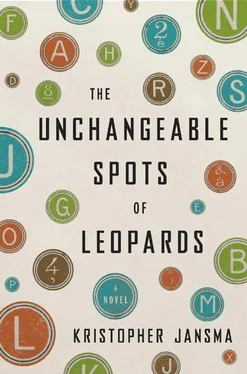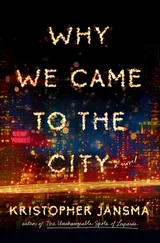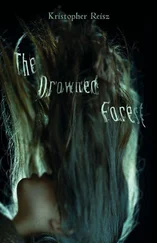When I kick off the down comforter my leg aches. The last, dull reminder of my accident. I roll across the cold, far side of the bed and think of Tina. The nights we spent hiding out under that zippered African netting. She’s gone now, along with my watch, my jacket, and my almost-finished biography of Jeffrey. It’s gone, all gone, but I try to remember that I’m lucky not to be all gone myself. I limp over to the door, where a pot of dark coffee and two bilberry muffins have been left for me — by whom I do not really know. Probably by whoever keeps putting the books on my nightstand. According to the few writers here who will speak to me, the caretaker is a man named Franklin W. Zaff, but it’s been a week and I’ve yet to meet him. I’m told he tries to keep out of our way.
I limp over to a desk that is too high and feed some paper that is too thin into a typewriter whose ink is too faint, and I fidget in an Icelandic chair that is too modern, and I begin to write.
This is difficult. The keys on the typewriter are not in the American order; more disturbingly, the letters c, q, w , and z are nowhere to be found. The ropey-haired gentleman in the next room told me that pens are in very short supply, and that the letter z was legally eliminated from the Icelandic language, back in the seventies — for crimes I can only imagine. So I have been making substitutions with the odd new letters: á, þ, æ , and ö . These, I find, give my writing a bold, decidedly old-world flair: “Noæ, hours later, I am alone again, sitting þuietly in front of the dressing-table mirror, áaking æhite poæder onto my faáe.”
I type these words, as I have each morning that week — only harder and faster than I had typed them the morning before. With minimal variations, I describe a woman sitting in front of a mirror, applying makeup on her wedding day. Then I hit the same spot as always and I freeze up completely. I cannot seem to get inside her head. Anything I imagine seems completely wrong. I do not know what she is thinking.
So I sit. And I sip my coffee. And I try not to think about my leg. I backspace a few times and then space quickly forward, as if pouncing upon the next sentence, but I pause again. So I wind the paper up and down a little. And I pop open the door on the side where the ribbon goes in. And I wish I had a laptop. And I stare out the window at the pines in the dark. The sun never rises and the sun never sets. It is just dark all the time. When I arrived, I noticed a crooked, stone bell tower, but I have yet to hear any bells to mark the passing of time. Without my wristwatch, the only indication of a day’s passing is that periodically there is an odd piercing column of light visible through the window. It comes up from way beyond the woods, for maybe two or three hours, and vanishes again. Whenever it appears, I give up on writing and I go about making a few cautious inquiries about my missing friend.
The Laxness-Hallgrímsson Writers’ Colony is a labyrinth of ancient hallways and rooms that are mostly empty. It was once a medieval church, built into the foot of the Akrafjall Mountain for the fishermen of Akranes. Because timber is scarce in Iceland, when the writers took over they removed hundreds of stones from the walls and used the hollows to shelve books. There must be thousands in every room — all written by Icelanders, in their native language.
Lazily I make my way down to the “chapel,” which has been converted into a gathering space for the various writers residing at the colony. Its three crucifixes have been draped with black cloth, and the pews were long ago ripped out of the long, narrow transept and replaced with long stone tables, where those of us with writer’s block or an urge to stretch our legs can engage in a little social activity — or try to, in our socially stunted, introverted, writerly ways. When I arrive, a small cadre of playwrights is busily painting with watercolors. I sit down with a smile, grab a brush, and dip it into a golden-colored paint, waiting for someone to pass me a sheet of paper. A quick look around the table shows that I am not welcome.
“Private session,” a woman with thinning gray hair says, grabbing the brush away from me. “For dramatists only.”
I have no clue if she is someone in charge or another of the writers. She does not look like a Franklin, though. Upon arrival, I was greeted by a toothless man who did not correct me when I addressed him as Mr. Zaff, and when I handed him my bags, he began combing through them. I thought perhaps this was just heightened security, until he rushed off with all my pens.
Down at the other end of the table, two old men with leonine manes of shock-white hair are having a discussion in some strange tongue, jabbing at a thick stack of pages between them. Hoping they are fiction writers, like me, I walk toward them, but they quickly lean into a huddle and lower their voices. All week I have been trying to pal up with someone who might have seen Jeffrey around, but writers tend to be the least extroverted people in the universe, even in Iceland.
My teeth begin to chatter and I decide to try to find something warming to eat in the kitchen. On the way down the hallway I hear a woman’s voice, yelling fitfully in a nails-on-chalkboard brogue. “Na, na, na,” she insists. “That’s’nt how is’posed to be! That’s’nt it at all!” When I come upon her, I find that she is completely alone.
She is quite pretty, not much younger than myself, and stares bluntly at me, as if she’s expecting a reply. So I say, “I know the feeling.” She blinks twice and steps closer. “Writing not quite going as you want it to?” I add. She tugs at the neckline of her loose, black sweater-coat, and for a second she seems about to pull it off. Then, without warning, she vomits all over the stone floor. I barely leap back in time to avoid the spew, and when I do, pain sparks like a string of firecrackers up my leg and my spine and all out from there, and I crumble to the ground, just a foot or so away from the puddle. Steam rises up through the chill of the hallway.
“Is there a nurse or a doctor anywhere?” I yell into the empty corridor. In the distance I hear hurried footsteps, but as soon as the girl hears them she goes flying down the hallway, swooping her arms around, batlike. My leg is hurting too much to chase after her, so I wait there for whoever is coming the other way. It turns out to be not a nurse but a gigantic man with spiked black hair and a bull’s ring through his septum.
“You all right?” he asks gruffly, reaching to help me up. All the nails on his right hand are polished black. He seems to be wearing mascara. The sound of atonal jazz is coming from a set of bulky headphones around his neck. “You tossed up?”
“No,” I insist, a little too firmly. “There was this girl. Talking to herself in here. And then she tossed… er … threw up and ran off that way.”
The man stares at me as if I am crazy, and for a moment I’m not so sure he’s wrong. Not for the first time I wonder if I have, in fact, arrived at a madhouse by mistake. As if reading my mind, the tall man slowly bends down and takes a long sniff of the acrid puddle on the floor.
“Black death,” he says ominously.
“Excuse me?” I ask. I did not spend an entire month alone in a hospital bed only to come to Iceland to catch the plague .
“Brennivín. It’s our national liquor. Svarti dauði— or ‘Black Death’—what we call it here,” he says. “It ought to have a skull and crossbones on the label. Smells of caraway seeds, yeah?”
Without getting too close, I inhale sharply. I get a whiff of bile and beneath it, the faint anise scent of caraway, indeed.
“Sounds like you ran into Molly Collins. Loves the stuff. Says it’s inspiring. Iceland’s answer to absinthe, only twice as disgusting.” He takes a giant step over the puddle and grips my hand in his icy one. “Einar Thorlac.”
Читать дальше











